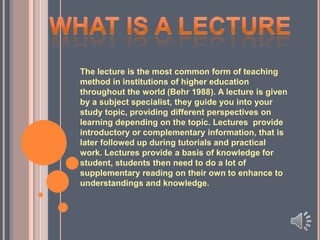Lecture style teaching assessment 2 004
•Download as PPTX, PDF•
1 like•131 views
Report
Share
Report
Share

Recommended
More Related Content
What's hot
What's hot (20)
Resources in teaching and learning physical science

Resources in teaching and learning physical science
Principles in the selection and preparation of instructional materials

Principles in the selection and preparation of instructional materials
Teaching and learning materials for motor and speech development

Teaching and learning materials for motor and speech development
Factors to consider in writing instructional materials

Factors to consider in writing instructional materials
More from karabell93
More from karabell93 (12)
Lecture style teaching assessment 2 004
- 1. The lecture is the most common form of teaching method in institutions of higher education throughout the world (Behr 1988). A lecture is given by a subject specialist, they guide you into your study topic, providing different perspectives on learning depending on the topic. Lectures provide introductory or complementary information, that is later followed up during tutorials and practical work. Lectures provide a basis of knowledge for student, students then need to do a lot of supplementary reading on their own to enhance to understandings and knowledge.
Editor's Notes
- What is a lecture? The study skills book outlines what a lecture is, a lecture is the most common form of teaching in institutions of higher education throughout the world. A lecture is given by a subject specialist, they guide you into your study topic, providing different perspectives on learning, depending on the topic. Lectures provide students with introductory or complementary information, that is later followed up during tutorials and practical work. Lectures are a way of providing a basis of knowledge for students, students will then need to ensure supplementary readings on their own to develop knowledge and understandings.